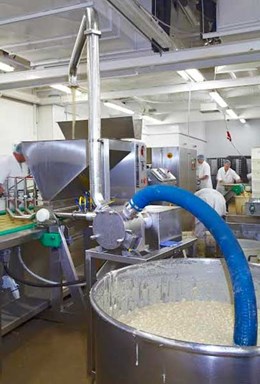-

In the plastics industry, the dual goals of economic efficiency and energy conservation are critical for achieving a sustainable and cost-effective future. As the demand for streamlined and environmentally friendly production increases, plastics manufacturers are challenged to innovate while maintaining responsible production practices.
-

The textile and garment industry uses a massive amount of energy in the production and manufacturing processes. And, due to geopolitical events, such as COVID-19 or the Russian-Ukraine war, energy costs have been rising which has also had a big impact on manufacturing companies , including the garment sector. Combined with the global increased pressure to adopt sustainable practices, garment manufacturers are prompted to seek innovative ways to reduce their energy consumption and enhance efficiency.
-

Energy and gas costs continue to rise, leaving businesses like food and beverage manufacturers feeling financially strained. The good news is that manufacturing businesses can significantly reduce their energy bills by becoming more energy efficient.
-

The energy crisis has affected businesses in all sectors, but perhaps none harder than those in manufacturing. Glass, ceramic and paper manufacturers warned that rising prices may mean they have to charge customers more. Manufacturers in energy-intensive industries such as steel and chemical also warned that the price of goods would increase for consumers because of the high and rising energy costs.
-

Fertiliser manufacturers have implemented solutions to significantly reduce their carbon emission in production and improve energy efficiency.
-

To promote steel exports to the European Union (EU) market, Vietnam's steel manufacturers need to optimise technology, save energy, and carry out product quality standards of the EU, according to Do Nam Binh, head of the Minerals and Metallurgy Division at the Department of Industry under the Ministry of Industry and Trade (MoIT).
-

Motorbike manufacturers, assemblers and importers in Vietnam are required to place an energy label on their brand-new motorcycles.
-

The European Commission is proposing stricter rules to ensure car manufacturers comply with all safety, environmental and production requirements.
-

The Federal Aviation Administration (FAA) selected eight manufacturers to receive $100 million in contracts to develop and demonstrate technologies that reduce fuel consumption, emissions, and noise, under the second phase of its Continuous Lower Energy, Emissions, and Noise (CLEEN II) program.
-

It’s important to seek out new ways to reduce energy in your daily usage, whether it’s by optimizing current energy use or embedding energy awareness in your company’s culture.
-

Manufacturers involved with fine ceramics are focusing on energy efficiency and resource conservation. In the past three years, there has been a great deal of optimization work in the entire process chain.
-

ThyssenKrupp will this week debut dozens of automobile technologies that will help car manufacturers make cars more energy efficient and lightweight, with weight savings of up to 60 percent and cost reductions of up to 10 percent.
-

The Glasgow manufacturers responsible for the invention of the world’s largest zero carbon 90ᵒC district heat pump has been shortlisted for a green tech award, with the chance of winning £20,000 to go towards the next project.
-

Local manufacturers who pay the lowest power tariffs in East African Community (EAC) region will further improve their competitiveness if they adopt efficient energy technology.
-

The National Electrical Manufacturers Association announced its support for federal energy-efficiency legislation on April 30, praising “the continued focus on common sense policies.”
-

With ever increasing recycling targets to meet, manufacturers of glass bottles and jars need to make sure that they can feed their furnaces with the highest quality of cullet (recycled glass) and maximise the energy and carbon saving benefits that this offers.
-

According to the BPMA, pumps account for no less than 10% of the world’s electricity consumption and two-thirds use up to 60% too much power.
-

The US Government is providing millions of dollars to help manufacturers increase the energy efficiency of their facilities in an effort to double energy productivity by 2030.
-

Indian wind turbine manufacturers and project developers have been advised by the government to make efforts to increase annual capacity addition to five times its current level, a leading Indian newspaper has reported.
-

As renewable energy technologies become more cost-competitive, the importance of government subsidies is set to decrease to create a sustainable growth platform for both developed and emerging markets, as well as manufacturers




















 Energy Efficiency and Conservation: Technology as the “Key”
Energy Efficiency and Conservation: Technology as the “Key”
 Opening of the 2025 Energy-Efficient Equipment and Green Transition Exhibition Fair
Opening of the 2025 Energy-Efficient Equipment and Green Transition Exhibition Fair
 Energy-saving solutions and green transition promotion
Energy-saving solutions and green transition promotion
 Consultation on the methodology for developing and updating energy consumption standards for four major industrial sectors
Consultation on the methodology for developing and updating energy consumption standards for four major industrial sectors
 Develop sales and marketing strategies for energy efficiency equipment and solution suppliers
Develop sales and marketing strategies for energy efficiency equipment and solution suppliers
 The 9th VEPG Steering Committee Meeting: Strengthening Coordination for Viet Nam’s Just Energy Transition
The 9th VEPG Steering Committee Meeting: Strengthening Coordination for Viet Nam’s Just Energy Transition